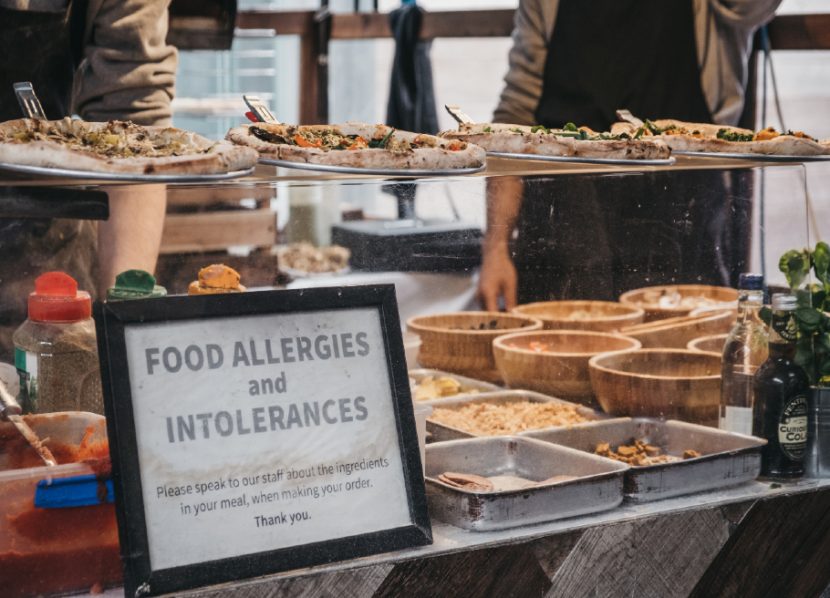The Recipe for Responsibility: Ensuring Allergen-Free Dining Experiences
By Robert McKeon
The food service industry is facing an increasing number of inquiries from customers regarding food allergens. This growing concern mandates an obligation for restaurants and food establishments to meet the allergen needs of their customers, thereby ensuring their safety.
The latest Food Code, issued by the Food and Drug Administration on December 28, 2022, has added an additional allergen, bringing the count to the ‘Big-9’: milk, eggs, fish, shellfish, wheat, soy, peanuts, tree nuts, and now, sesame. This updated code also recommends that front-line staff be trained and made aware of these Big-9 allergens, including which foods contain them. It is essential for every staff member at the front of the house to recognize symptoms of an allergic reaction, such as wheezing, hives, itchy rashes, and difficulty breathing, and to know how to respond effectively if a customer goes into anaphylactic shock, a potentially life-threatening condition.
With over 170 known food allergens, the Big-9 represent approximately 90% of the common allergens in the United States. While other allergens, like mustard, celery, and sulfites, are less common, they are still of concern. Statistics show that 25% of allergic reactions occur outside the home, which means restaurants and similar establishments must be prepared.
Training is crucial for any organization, and how staff are educated in allergen management can significantly impact the success of a restaurant. Management must establish a comprehensive plan and process, ensuring all staff members work cohesively when an allergen-specific meal is requested. Ideally, at least one staff member should be knowledgeable about every ingredient in each menu item at all times.
Training is crucial for any organization, and how staff are educated in allergen management can significantly impact the success of a restaurant.
Front-of-house staff should not assume that all customers will disclose their allergies. Incorporating a question about food allergies or intolerances into the initial greeting can help identify any special dietary needs early on. All staff should be familiar with the Big-9 allergens and aware of which menu items contain these allergens, including daily specials and those with ‘secret’ ingredients. Ensuring the dining area is clean and sanitized before seating customers is also vital; even trace amounts of allergens, like breadcrumbs or shrimp shells, can cause severe reactions.
In the kitchen, staff must understand how to handle allergen-free meal requests. Cross-contact, where an allergen inadvertently makes contact with an allergen-free meal, must be strictly avoided. Unlike bacteria, allergens cannot be eliminated through cooking. Kitchen staff should never guess and always check ingredient lists thoroughly.
Colour-coded tools, like purple cutting boards, knives, and utensils, are recommended for preparing allergen-free foods. Ensuring that all utensils are cleaned and sanitized before use is crucial, as is the practice of washing hands, wearing new disposable gloves, and donning a clean apron. Meals for customers with allergies should be prepared in a designated area and clearly identified to the serving staff.
In self-service areas, each item should be clearly marked, indicating whether it contains any of the Big-9 allergens. A dedicated staff member should be present to answer questions and oversee the area for potential contamination risks. Each food item should have its own serving utensil to prevent cross-contact.
In the event of an emergency, such as a customer showing signs of an allergic reaction, staff should assist with medication like an auto-injector and call for emergency services. Staying calm, having the individual remain seated or lying down, and not moving them are critical steps to ensure their safety until help arrives.
The food service industry is committed to making guests happy through the food they create, despite the challenges. Planning and training for allergen management are vital for success. Restaurant staff, often the unsung superheroes of the food world, play a crucial role in ensuring a safe and enjoyable dining experience for all customers.
About the Author
Robert McKeon is a graduate from the CIA (Culinary Institute of America in Hyde Park, NY) and has been in Food Service working in Restaurants, Hotels, Catering and Healthcare for over 35 years. He currently own and operates “Food Safety Chef” with training with Food Safety, Allergen Awareness and Alcohol certification.

-
 FeaturedSupply Chain Management
Building a Safer Food System with Smart Supply Chain Strategies
FeaturedSupply Chain Management
Building a Safer Food System with Smart Supply Chain Strategies
-
 FeaturedSupply Chain Management
Driving Food Safety: The Role of Transportation Management Systems
FeaturedSupply Chain Management
Driving Food Safety: The Role of Transportation Management Systems
- Podcast How Blockchain is Transforming the Food Industry: Perspectives from Ali Asgar Abbas, Co-Founder of ProofEasy
-
 FeaturedFood Safety
The Realities of IPM: Challenges and Solutions for Pest Prevention in Food Safety
FeaturedFood Safety
The Realities of IPM: Challenges and Solutions for Pest Prevention in Food Safety
- Podcast How Advanced Inspection Technology Can Transform Food Safety: Perspectives from Kye Luker
-
 FeaturedPublic Health
The Silent Invader: Uncovering H. pylori and Its Harmful Risks, Including Foodborne Illness
FeaturedPublic Health
The Silent Invader: Uncovering H. pylori and Its Harmful Risks, Including Foodborne Illness




